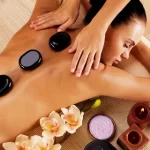
If you’ve been wondering if stress could be the cause behind your frequent acne breakouts or your eczema flare-ups, the answer is yes. Stress impacts many different areas of our physical health, including our skin. Read on to discover exactly how stress impacts our skin and what you can do to keep your skin glowing even when you’re under stress.
The Ways Stress Impacts Your Skin
First of all, when we are stressed, we tend to skip out on parts of our daily routine that contribute to skin health, such as doing our 3-step skincare routine, exercising regularly, and drinking enough water. This further compounds the effects of stress on our skin. Some people may also pick or scratch at their skin when they are stressing, worsening breakouts and causing scabs and scarring. When we’re stressed, our body produces more of certain hormones, most importantly cortisol and adrenaline. Increased cortisol levels cause our skin to produce more sebum (oil), which can clog our pores and lead to more frequent acne breakouts. Stress also increases the body’s inflammatory response, which can lead to acne lesions becoming larger and more inflamed.
This increased inflammatory response can also exacerbate other existing skin issues, including eczema, psoriasis, and rosacea. While stress itself does not cause these conditions directly, it can be a contributing factor to a flare-up. If you’re been having a flare-up and can’t pinpoint what triggered it, then stress might be the culprit.

In some cases, extreme or chronic stress can lead to an outbreak of hives, fever blisters, and other skin rashes, due to increased levels of histamines in the body. Stress hives typically go away on their own once your stress calms down, but it’s important to get checked out by a doctor or dermatologist if you think that you might be having an allergic reaction instead. When we’re stressed, we also tend to make dietary changes that affect our skin negatively. For instance, we might drink more caffeine to stay awake, further elevating our cortisol levels and contributing to acne breakouts. We might drink alcohol to help ourselves relax, which dehydrates the body and makes the face look puffy. And when we’re stressed, we often eat prepared foods that are high in sugar and sodium, increasing inflammation in the body and further contributing to negative effects on our skin.
We also tend to sleep less when we’re stressed, and that sleep deprivation affects our skin as well. First of all, not getting enough sleep contributes to higher cortisol levels in the body and increased oil production that can cause acne. It also can exacerbate the appearance of puffiness, dark circles under the eyes, and wrinkles and fine lines.

How to Stop Stress from Wrecking Your Skin
Clearly, stress can have negative effects on your skin in multiple different ways. At this point, you are probably wondering how you can take steps to protect your skin from the effects of stress. Thankfully, there are many strategies that you can follow to help protect your skin from the negative effects of stress:
Stick with your skincare routine.
We know it’s tough to stick with a skincare routine when you’re busy, but it’s important to stay consistent to help protect your skin from the effects of stress. If you find yourself skipping your skincare routine because it’s too long and complicated, try cutting back to the most essential steps: a facial cleanser followed by a moisturizer, plus sunscreen in the morning. Makeup-removing wipes will make it easier to clean your face at night if you’re too tired to wash it.
Follow a healthy diet as much as possible.
When you’re under stress, do your best not to give in to the cravings for salt and sugar. Instead, prioritize a diet that is full of lean proteins, whole grains, and fruits and vegetables. Be sure to drink plenty of water to stay hydrated. Also watch your caffeine and alcohol consumption and try to minimize it whenever possible. Drinking coffee is no replacement for actually sleeping!
Get enough sleep.
Speaking of sleep, you should be trying to get at least seven to nine hours a night (and some people need even more). To promote better sleep, try to put away screens at least an hour before bed. You should also go to bed and wake up at the same time every day — including both weeknights and weekends — to get yourself into a routine and promote a healthy circadian rhythm.
Keep exercising regularly.
Exercising is one of the best stress reduction techniques you can try. Not only does it reduce the production of stress hormones, but it also increases the production of feel-good neurotransmitters such as dopamine. For added benefits, try exercising outside or going for a walk in nature so that you can soak up some vitamin D from the sun and breathe the fresh air.
Practice stress management techniques.
Besides exercises, there are lots of different stress management techniques that you can follow: yoga, meditation, reading a book, taking a long bath, getting a massage — the list goes on. Stress management techniques are very personal, and what works for one person may not work for you, so experiment with some different methods to find the most relaxing ones for you.
Prioritize your mental health.
When you’re under extreme or chronic stress, DIY stress management techniques might not be able to help you enough. In these situations, you might find it beneficial to schedule an appointment with a therapist or counselor who can help you talk through the stressors in your life and formulate healthy coping mechanisms.
What are your other top tips for fighting stress and keeping your skin glowing? Let us know in the comments below!







Leave a Reply